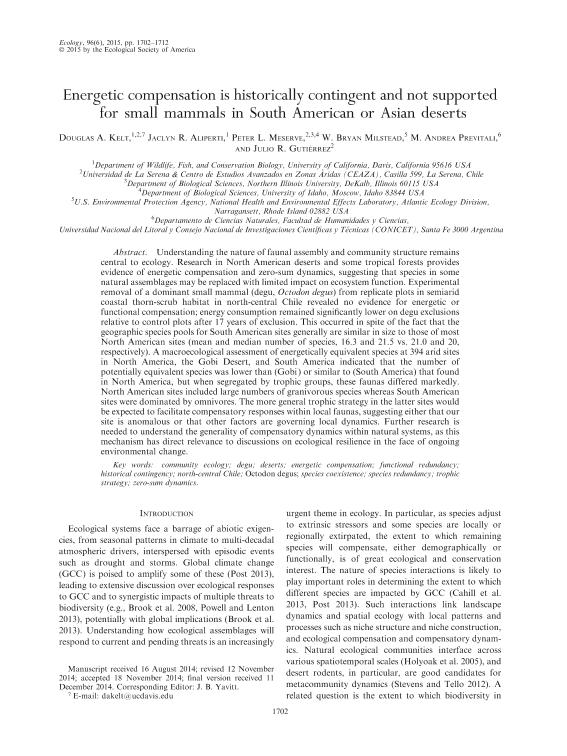Mostrar el registro sencillo del ítem
dc.contributor.author
Kelt, Douglas A.
dc.contributor.author
Aliperti, Jaclyn R.
dc.contributor.author
Meserve, Peter L.
dc.contributor.author
Milstead, W. Bryan
dc.contributor.author
Previtali, Maria Andrea

dc.contributor.author
Gutiérrez, Julio R.

dc.date.available
2022-12-05T14:53:03Z
dc.date.issued
2015-06
dc.identifier.citation
Kelt, Douglas A.; Aliperti, Jaclyn R.; Meserve, Peter L.; Milstead, W. Bryan; Previtali, Maria Andrea; et al.; Energetic compensation is historically contingent, and is not supported for small mammals in South American or Asian deserts; Ecological Society of America; Ecology; 96; 6; 6-2015; 1702-1712
dc.identifier.issn
0012-9658
dc.identifier.uri
http://hdl.handle.net/11336/180182
dc.description.abstract
Understanding the nature of faunal assembly and community structure remains central to ecology. Research in North American deserts and some tropical forests provides evidence of energetic compensation and zero-sum dynamics, suggesting that species in some natural assemblages may be replaced with limited impact on ecosystem function. Experimental removal of a dominant small mammal (degu, Octodon degus) from replicate plots in semiarid coastal thorn-scrub habitat in north-central Chile revealed no evidence for energetic or functional compensation; energy consumption remained significantly lower on degu exclusions relative to control plots after 17 years of exclusion. This occurred in spite of the fact that the geographic species pools for South American sites generally are similar in size to those of most North American sites (mean and median number of species, 16.3 and 21.5 vs. 21.0 and 20, respectively). A macroecological assessment of energetically equivalent species at 394 arid sites in North America, the Gobi Desert, and South America indicated that the number of potentially equivalent species was lower than (Gobi) or similar to (South America) that found in North America, but when segregated by trophic groups, these faunas differed markedly. North American sites included large numbers of granivorous species whereas South American sites were dominated by omnivores. The more general trophic strategy in the latter sites would be expected to facilitate compensatory responses within local faunas, suggesting either that our site is anomalous or that other factors are governing local dynamics. Further research is needed to understand the generality of compensatory dynamics within natural systems, as this mechanism has direct relevance to discussions on ecological resilience in the face of ongoing environmental change.
dc.format
application/pdf
dc.language.iso
eng
dc.publisher
Ecological Society of America

dc.rights
info:eu-repo/semantics/openAccess
dc.rights.uri
https://creativecommons.org/licenses/by-nc-sa/2.5/ar/
dc.subject
COMMUNITY ECOLOGY
dc.subject
DEGU
dc.subject
DESERTS
dc.subject
ENERGETIC COMPENSATION
dc.subject
FUNCTIONAL REDUNDANCY
dc.subject
HISTORICAL CONTINGENCY
dc.subject
NORTH-CENTRAL CHILE
dc.subject
OCTODON DEGUS
dc.subject
SPECIES COEXISTENCE
dc.subject
SPECIES REDUNDANCY
dc.subject
TROPHIC STRATEGY
dc.subject
ZERO-SUM DYNAMICS
dc.subject.classification
Ecología

dc.subject.classification
Ciencias Biológicas

dc.subject.classification
CIENCIAS NATURALES Y EXACTAS

dc.title
Energetic compensation is historically contingent, and is not supported for small mammals in South American or Asian deserts
dc.type
info:eu-repo/semantics/article
dc.type
info:ar-repo/semantics/artículo
dc.type
info:eu-repo/semantics/publishedVersion
dc.date.updated
2022-12-05T11:01:09Z
dc.journal.volume
96
dc.journal.number
6
dc.journal.pagination
1702-1712
dc.journal.pais
Estados Unidos

dc.description.fil
Fil: Kelt, Douglas A.. University of California at Davis; Estados Unidos
dc.description.fil
Fil: Aliperti, Jaclyn R.. University of California at Davis; Estados Unidos
dc.description.fil
Fil: Meserve, Peter L.. Universidad de La Serena; Chile. University of Idaho; Estados Unidos. Northern Illinois University; Estados Unidos
dc.description.fil
Fil: Milstead, W. Bryan. Environmental Protection Agency; Estados Unidos
dc.description.fil
Fil: Previtali, Maria Andrea. Universidad Nacional del Litoral. Facultad de Humanidades y Ciencias; Argentina. Consejo Nacional de Investigaciones Científicas y Técnicas; Argentina
dc.description.fil
Fil: Gutiérrez, Julio R.. Universidad de La Serena; Chile
dc.journal.title
Ecology

dc.relation.alternativeid
info:eu-repo/semantics/altIdentifier/doi/http://dx.doi.org/10.1890/14-1569.1
dc.relation.alternativeid
info:eu-repo/semantics/altIdentifier/url/https://esajournals.onlinelibrary.wiley.com/doi/abs/10.1890/14-1569.1
Archivos asociados
